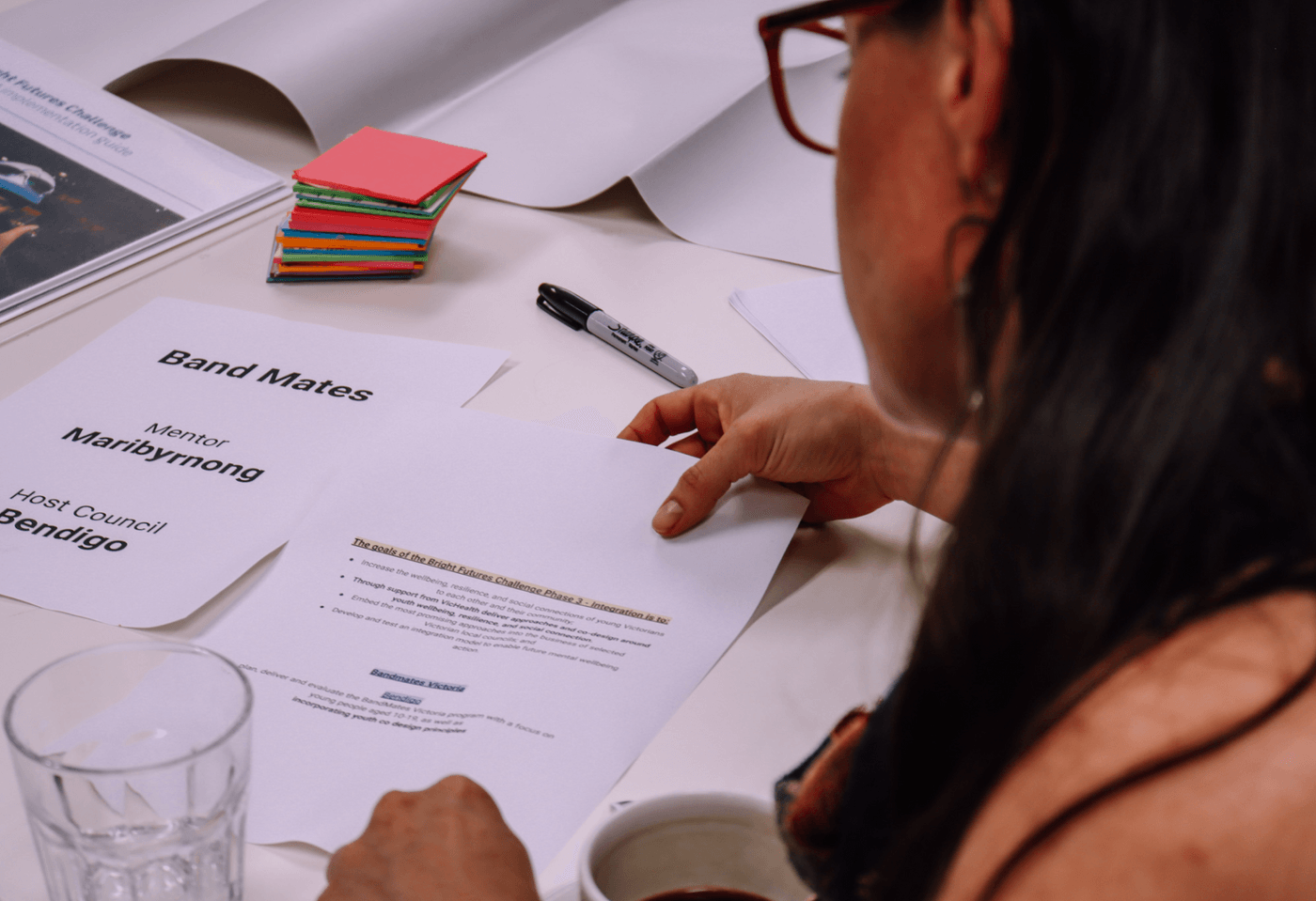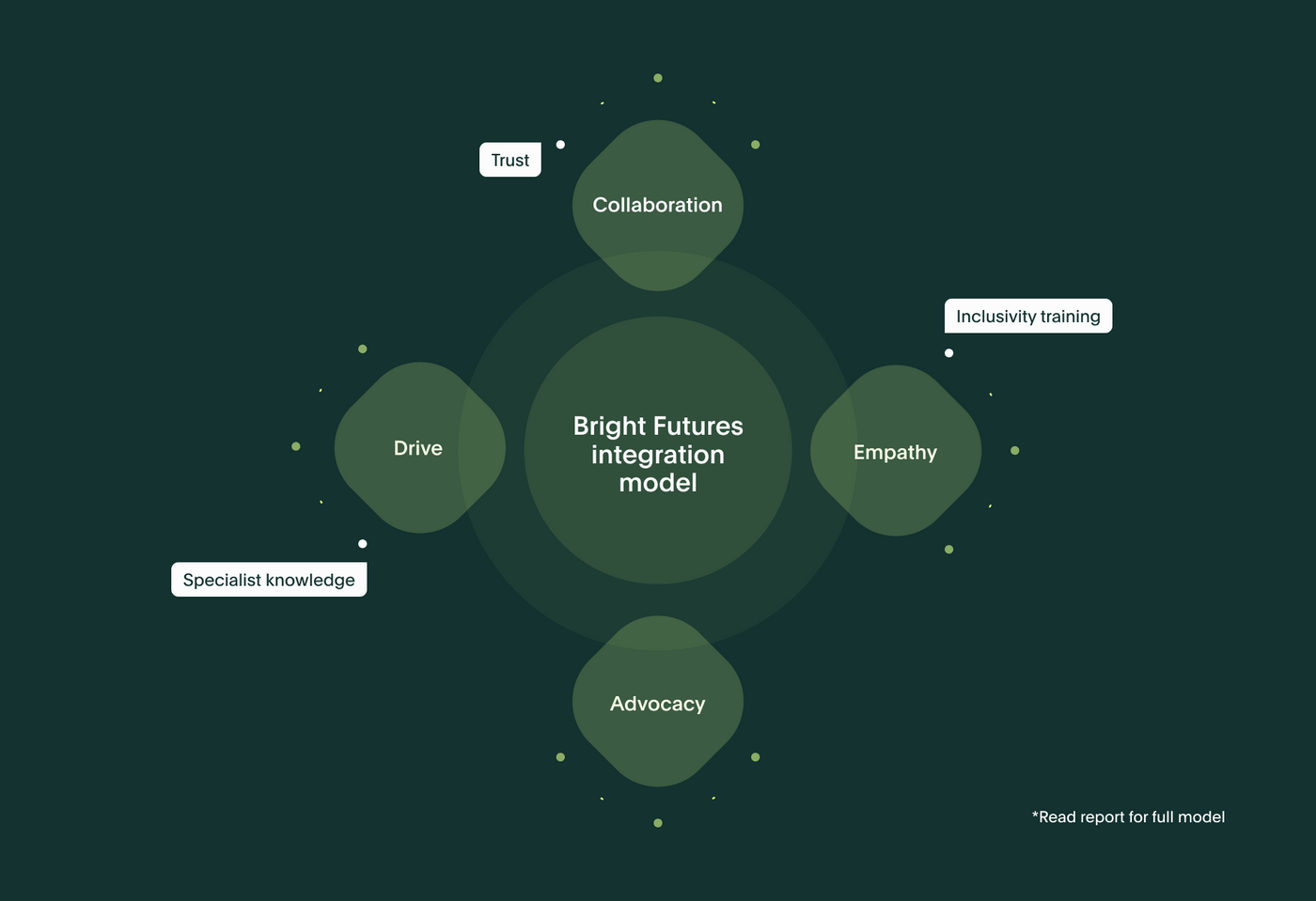Context
VicHealth works in partnership with organisations, communities and individuals to make health a central part of the lives of all Victorians by promoting good health and preventing ill-health.
Mental wellbeing is a key strategic imperative for VicHealth. One of the key priorities of VicHealth’s mental wellbeing agenda is to create more opportunities for young people to build their resilience and positive social connections.
In 2016, VicHealth launched the Bright Futures Challenge, inviting Victorian local councils to develop responses to the challenges identified in VicHealth’s megatrends report. This report focused on megatrends impacting the mental wellbeing of young Victorians over the coming 20 years.
The first two rounds of the Bright Futures Challenge enabled local councils to work directly with young people, using co-design as a framework to create over 20 new programs and initiatives for their communities. Projects aimed to answer the following challenges:
- How do we ensure that all young people are resilient in the face of new and rapidly changing ways of working and living?
- What steps can our communities take to support the nearly one million young people in Victoria to be more socially connected, more included and more empowered into the future?
All of the projects associated with the Challenge enabled young people to share their stories, learn new skills and become more confident and connected to their communities.
Bright Futures integration phase
In 2019, the Bright Futures Challenge entered its third phase, the integration phase, with a focus on incorporating the learnings and achievements of the earlier phases in new contexts and local government areas, and to build sustainability for the most promising projects. Portable was engaged as the Integration Lead Planner to identify and strengthen sustainable project delivery models and support ongoing improvements in Victorian young people’s well-being, resilience, and social connections.
In the integration phase, VicHealth identified four projects from earlier phases of the Bright Futures Challenge that had shown the most promising impact on young people’s mental wellbeing and had demonstrated strong potential to be replicated in areas across Victoria.
VicHealth recognised that they needed to support these local councils to become ‘Integration Mentors’ to the councils which had been selected to replicate the programs, known as ‘Integration Hosts’ to achieve replication and rollout successfully.
The projects selected for replication were:
ConnectMates (formerly BandMates Victoria) - Maribyrnong Council
BandMates matched people with a disability or mental health condition to trained community volunteers to attend a live music show at venues and festivals across Victoria, placing previously inaccessible experiences within reach. ConnectMates builds on this model to provide multiple opportunities for young people to increase social connection and wellbeing through a range of activities.
Young Women’s Leadership Program - Monash Council
The Young Women’s Leadership program provides a structured approach to increasing young women’s skills, confidence and leadership opportunities in a peer-learning environment. The Program aims to engage young women from migrant and refugee backgrounds as a priority.
We Know Your Name But Not Your Story - Corangamite Shire
We Know Your Name But Not Your Story engages and equips young people to develop digital and media stories about connecting with their community. Knowing, appreciating and understanding someone else’s story has helped to support stronger community connectivity and increased the likelihood of making meaningful social connections.
Safe and Supported - Cardinia Shire
The Safe and Supported program aims to build the resilience and social connections of young LGBTIQA+ people and raise awareness in organisations to reduce the abuse, discrimination, bullying and isolation experienced by LGBTIQA+ young people. It does so through the delivery of a range of initiatives and by engaging young people to guide them.
Approach
In recognition of the complex partnerships and knowledge transfer processes required to achieve replication and sustainability, Portable was engaged to lead the planning, design and execution of an integration strategy.
Discovery workshops
Portable kicked off the Bright Futures project with two discovery workshops attended by Integration Mentors, staff from local councils which had implemented the Bright Futures projects chosen for rollout.
The workshops focused on drawing out insights from the Integration Mentors that could inform how to support the replication and sustainability of programs. Portable ran a session called ‘Anecdote Circles’, which uses the dynamic nature of a group of people to build narratives around a theme. This allowed us to surface challenges and opportunities, which were then used for further sensemaking activities internally. Insights from this exercise were then used to inform the integration strategy.

Community Canvas
We then ran a workshop at the official launch of the Bright Futures Community of Practice. The purpose of this event was to bring all of the Bright Futures host and mentor councils together to start the work of integration. We used a ‘Community Canvas’ as a framework to allow the group to discuss the ways in which they wanted to work together as a Community of Practice. An ‘Identity’ canvas allowed us to explore the purpose, values and success definition of the group. The ‘Experience’ canvas prompted discussions around content, rituals and roles, while the ‘Structure’ canvas prompted the group to discuss preferred channels and platforms for a digital Community of Practice.
Community of Practice
We then facilitated face-to-face Community of Practice events bi-monthly for the year-long duration of the project. The Community of Practice was an ideal forum to provide expertise and hands-on facilitation to support all local councils engaged in the Bright Futures integration phase. This network enabled the building of capabilities, the exchange of skills and sharing of practical resources to facilitate the achievement of program replication and sustainability.
The Community of Practice was the key mechanism to support partnerships across all the councils involved in the Challenge.
Each Community of Practice event focused around themes chosen by Integration Hosts and Mentors at the launch event. Some of the themes included youth engagement, co-design and sustainability of programs.
Pivoting in response to COVID-19
With the onset of the global pandemic, VicHealth understood that protecting health and wellbeing was more important than ever. Whilst the pandemic affected all Victorians, research conducted by VicHealth showed that 4 in 10 young people aged 18 to 24 found it hard or very hard to stay connected with family and friends during the pandemic – significantly more than the average for all Victorians (3 in 10)*.
It was for this reason that VicHealth initiated a change to project deliverables to maximise outcomes, requesting the co-design of project handbooks to be written in partnership with councils. We had initially been working towards publishing a documented Integration Model; however, it was recognised that given the current context, a program handbook for each of the phase three programs would have a greater impact. The handbooks would build on the original Program Implementation Guides written by the Mentor Councils and would include insights and learnings from the Mentor Councils. It was envisaged that the creation of handbooks could support the wider adoption and sustainability of programs into new local government areas to create better mental health and wellbeing outcomes for more young people. The handbooks are now embedded into VicHealth’s partnership activity with local councils to advance social connection and mental wellbeing. The creation of handbooks was a collaborative process between VicHealth and Portable. VicHealth generated the content in partnerships with the councils and with assistance from Portable through a series of workshops.

Outcomes
- The initial focus of Portable’s engagement was on the successful integration and transfer of knowledge from Integration Mentors to Integration Hosts. We did this by creating the frameworks and conditions for this to happen. The face-to-face and online Community of Practice allowed relationships to develop and ideas to be exchanged between hosts and mentors.
- All stage three integration programs engaged young people in their local areas through direct participation and community strengthening, with qualitative data suggesting improved resilience, social connection and mental wellbeing for most young people involved.
- In collaboration, Portable and VicHealth wrote a handbook for each of the four programs in the Bright Futures integration phase to further enable replication in new Victorian local councils. These handbooks articulated the capabilities and resources required to establish and sustain successful programs and will live on beyond this program for local councils to use in the future should they wish to implement any of the Bright Futures programs.